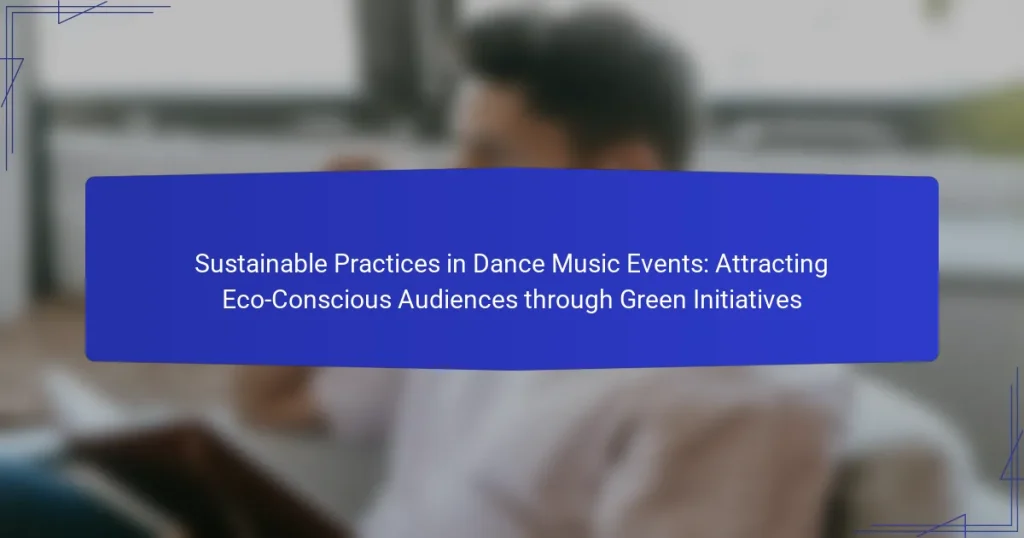Sustainable practices in dance music events focus on strategies that minimize environmental impact, such as using renewable energy sources like solar and wind power. Key initiatives include waste reduction through recycling and composting, promoting digital tickets to decrease paper waste, and encouraging local food vendors to support sustainable sourcing. Transportation options, including carpooling and public transit partnerships, aim to lower emissions from attendees. Research indicates a strong preference among festival-goers for events that prioritize sustainability, highlighting the increasing demand for eco-friendly practices in the dance music industry. This article explores various green initiatives and their effectiveness in attracting eco-conscious audiences.

What are Sustainable Practices in Dance Music Events?
Sustainable practices in dance music events involve strategies that minimize environmental impact. These practices include using renewable energy sources, such as solar or wind power, to run events. Implementing waste reduction strategies, like recycling and composting, helps manage waste effectively. Additionally, promoting digital tickets reduces paper waste.
Encouraging local food vendors supports sustainable sourcing and reduces carbon footprints. Transportation initiatives, such as carpooling or public transit partnerships, decrease emissions from attendees. Many festivals now incorporate eco-friendly materials in stages and decorations. These practices not only protect the environment but also attract eco-conscious audiences.
Research shows that 70% of festival-goers prefer events that prioritize sustainability. This trend highlights the growing demand for environmentally responsible practices in the dance music scene.
How do these practices impact the environment?
Sustainable practices in dance music events positively impact the environment by reducing waste and minimizing carbon footprints. Implementing recycling programs decreases landfill contributions. Using renewable energy sources lowers greenhouse gas emissions. Encouraging public transportation reduces individual vehicle use. Local sourcing of food and materials supports sustainable agriculture. These practices promote awareness of environmental issues among attendees. Research indicates that events adopting green initiatives attract eco-conscious audiences, further amplifying their positive effects.
What specific environmental issues do dance music events contribute to?
Dance music events contribute to several specific environmental issues. These include significant waste generation, including plastic bottles and food packaging. Noise pollution is another concern, affecting local wildlife and communities. Additionally, energy consumption during events often relies on non-renewable sources, leading to increased carbon emissions. Transportation to and from events contributes to greenhouse gas emissions. Land degradation can occur due to large crowds and infrastructure development. Water usage for sanitation and cooling can strain local resources. Lastly, chemical pollution may arise from the use of certain materials and products at these events. Each of these issues highlights the environmental impact associated with dance music events.
How can sustainability mitigate these environmental impacts?
Sustainability can mitigate environmental impacts by promoting eco-friendly practices at events. Implementing waste reduction strategies minimizes landfill contributions. Utilizing renewable energy sources decreases carbon emissions significantly. Encouraging public transportation reduces traffic congestion and pollution. Sourcing local food and materials supports sustainable agriculture and reduces transportation emissions. Educating attendees about sustainability fosters a culture of environmental responsibility. These practices collectively lead to a lower environmental footprint for dance music events.
Why is sustainability important for dance music events?
Sustainability is important for dance music events because it minimizes environmental impact and promotes social responsibility. Dance music events often generate significant waste and carbon emissions. Implementing sustainable practices can reduce these negative effects. For example, using renewable energy sources can lower carbon footprints. Additionally, sustainable initiatives can attract eco-conscious audiences. Research indicates that 70% of festival-goers prefer events with green practices. This preference can enhance ticket sales and overall attendance. Furthermore, sustainability fosters community engagement and supports local economies. By prioritizing sustainability, dance music events can lead the way in environmental stewardship.
What benefits does sustainability offer to event organizers?
Sustainability offers numerous benefits to event organizers. It enhances brand reputation by appealing to eco-conscious audiences. Sustainable practices can lead to cost savings through reduced waste and energy consumption. Events that prioritize sustainability often attract more attendees, increasing ticket sales. Moreover, partnerships with sustainable vendors can improve supply chain efficiency. Implementing green initiatives can also foster community goodwill and support. These practices contribute to long-term viability by aligning with global sustainability goals. Research shows that 70% of consumers prefer brands that are environmentally responsible.
How does sustainability enhance the attendee experience?
Sustainability enhances the attendee experience by creating a more engaging and responsible event atmosphere. Attendees are increasingly drawn to events that prioritize environmental stewardship. Sustainable practices, such as waste reduction and energy efficiency, contribute to a healthier event environment. For instance, events that utilize renewable energy sources can reduce their carbon footprint significantly. This commitment to sustainability can foster a sense of community among attendees. Participants often feel more connected to events that reflect their values. Additionally, sustainable initiatives can lead to cost savings, which can be passed on to attendees through lower ticket prices. Research shows that 70% of festival-goers prefer events with eco-friendly practices. This preference highlights the importance of sustainability in enhancing overall attendee satisfaction.

What are some examples of Green Initiatives in Dance Music Events?
Examples of green initiatives in dance music events include the use of renewable energy sources. Many festivals now operate on solar or wind power. Waste reduction strategies are also prominent. Events implement recycling and composting programs to minimize landfill contributions. Additionally, eco-friendly transportation options are encouraged. Attendees may be provided with shuttles or bike parking to reduce carbon footprints. Some events utilize biodegradable or reusable materials for food and drink containers. Partnerships with local environmental organizations are common for educational outreach. These initiatives demonstrate a commitment to sustainability in the dance music industry.
How can waste management be improved at these events?
Implementing comprehensive recycling programs can significantly improve waste management at events. Providing clearly labeled bins for recycling, composting, and landfill waste encourages proper disposal. Educating attendees about waste sorting and the importance of sustainability enhances participation. Partnering with local waste management services ensures efficient collection and processing of waste. Utilizing biodegradable or reusable materials reduces overall waste generation. Tracking waste metrics helps identify areas for improvement in future events. Research shows that events adopting these practices can decrease waste by up to 60%.
What strategies can be implemented for recycling and composting?
Implementing strategies for recycling and composting includes establishing clear waste separation stations. These stations should be easily accessible and clearly labeled. Providing educational materials about what can be recycled or composted is essential. Engaging volunteers to oversee waste stations can improve compliance. Offering incentives for attendees who recycle or compost can encourage participation. Partnering with local waste management services can enhance the effectiveness of these strategies. Regular monitoring and feedback can help improve the recycling and composting process. According to the EPA, recycling can reduce waste by up to 75%, demonstrating its significance.
How can event organizers reduce single-use plastics?
Event organizers can reduce single-use plastics by implementing several strategies. They should prioritize the use of reusable materials such as metal or glass drink containers. Offering water refill stations encourages attendees to bring their own bottles. Providing biodegradable or compostable food containers and utensils minimizes plastic waste. Encouraging vendors to use sustainable packaging can further reduce plastic consumption. Implementing a waste management plan that includes recycling and composting is essential. Educating attendees about the importance of reducing plastic use can foster a culture of sustainability. Statistics show that events adopting these measures can decrease plastic waste by up to 70%.
What role does energy consumption play in sustainable events?
Energy consumption significantly impacts the sustainability of events. High energy usage contributes to increased carbon emissions, which harm the environment. Sustainable events aim to minimize energy consumption to reduce their ecological footprint. Utilizing renewable energy sources, such as solar or wind power, can lower overall energy consumption. Efficient energy management practices, like LED lighting and energy-efficient sound systems, also play a crucial role. According to a study by the Green Music Initiative, events that implement energy-efficient measures can reduce energy consumption by up to 50%. Therefore, managing energy consumption is essential for hosting environmentally friendly events.
What alternative energy sources can be utilized?
Solar energy is a widely utilized alternative energy source. It harnesses sunlight through photovoltaic cells to generate electricity. Wind energy is another significant source, using turbines to convert wind kinetic energy into electrical power. Biomass energy, derived from organic materials, can also be converted into electricity or heat. Geothermal energy taps into the Earth’s internal heat for power generation. Hydropower, generated by flowing water, is a reliable alternative source as well. Each of these sources contributes to reducing carbon emissions and promoting sustainability. According to the International Renewable Energy Agency, renewable energy sources accounted for 29% of global electricity generation in 2020.
How can energy efficiency be maximized during events?
Energy efficiency can be maximized during events by implementing several key strategies. Utilizing LED lighting reduces energy consumption significantly compared to traditional bulbs. Scheduling events during daylight hours can minimize reliance on artificial lighting. Employing energy-efficient sound systems also decreases power usage. Encouraging digital ticketing and minimizing printed materials cuts down on resource waste. Implementing real-time energy monitoring allows for adjustments to be made on the fly. Engaging vendors who prioritize sustainability ensures that food and beverage operations are energy-efficient. Finally, promoting carpooling and public transportation reduces the carbon footprint associated with travel. These measures collectively contribute to a more sustainable event experience.

How can dance music events attract eco-conscious audiences?
Dance music events can attract eco-conscious audiences by implementing sustainable practices. These practices include using renewable energy sources, such as solar power, to minimize carbon footprints. Additionally, events can promote waste reduction through recycling and composting initiatives. Providing eco-friendly transportation options, like bike parking and public transit partnerships, encourages attendees to choose greener travel methods.
Offering locally sourced food and beverages supports sustainable agriculture and reduces transportation emissions. Collaborating with environmentally focused brands for sponsorships can enhance the event’s green image. Transparent communication about sustainability efforts can further engage eco-conscious attendees. Research indicates that 73% of consumers prefer brands that are environmentally responsible, highlighting the importance of these practices.
What marketing strategies can promote sustainability initiatives?
Utilizing social media campaigns effectively promotes sustainability initiatives. These campaigns can increase awareness and engagement among eco-conscious audiences. Collaborations with influencers who focus on sustainability can amplify the message. Hosting events that showcase sustainable practices can also attract attention. Offering incentives for eco-friendly behaviors, such as discounts for using public transport, encourages participation. Educational content about the benefits of sustainability can foster a deeper understanding. Surveys indicate that 74% of consumers prefer brands that are environmentally responsible. Leveraging this preference can enhance brand loyalty and community support.
How can social media be leveraged to reach eco-conscious attendees?
Social media can be leveraged to reach eco-conscious attendees by creating targeted campaigns that highlight sustainability efforts. Platforms like Instagram and Facebook allow for visually appealing content that showcases eco-friendly practices. Engaging posts can include behind-the-scenes looks at sustainable event planning. Hashtags related to sustainability can increase visibility among eco-conscious users. Collaborating with eco-influencers can amplify messages and reach wider audiences. User-generated content can promote community involvement and showcase attendee commitment to sustainability. Analytics tools can track engagement and refine strategies to better connect with this audience. In 2022, 66% of consumers reported that they are willing to pay more for sustainable brands, indicating the importance of effective communication on social media.
What partnerships can enhance credibility and reach?
Partnerships with environmental organizations can enhance credibility and reach for dance music events. Collaborating with well-known eco-friendly brands boosts the event’s image. These partnerships demonstrate a commitment to sustainability. They attract eco-conscious audiences who value green initiatives. Additionally, working with local governments can increase visibility and support. Such collaborations can lead to shared marketing efforts. This can expand the event’s reach within the community. Research shows that events promoting sustainability see higher attendance rates. This indicates that partnerships focused on eco-friendliness are effective.
What are the challenges in implementing sustainable practices?
Implementing sustainable practices faces several challenges. One major challenge is the financial cost associated with sustainable initiatives. Many organizations struggle to allocate budgets for eco-friendly materials and technologies. Another challenge is the lack of awareness among stakeholders. Event organizers may not fully understand the benefits of sustainability. Additionally, logistical issues can arise in sourcing sustainable products. Limited availability of eco-friendly options can hinder implementation. Resistance to change from traditional practices is also common. Some stakeholders may prioritize convenience over sustainability. Lastly, measuring the impact of sustainable practices can be difficult. Without clear metrics, organizations may find it hard to justify their efforts.
How can financial constraints be addressed?
Financial constraints can be addressed through effective budgeting and cost management strategies. Establishing a clear budget helps in identifying necessary expenses. Prioritizing essential costs over non-essential ones is crucial. Seeking sponsorships from eco-conscious brands can provide additional funding. Implementing cost-saving measures, like using local vendors, reduces expenses. Utilizing volunteer support can minimize labor costs significantly. Exploring grants for sustainability initiatives can also alleviate financial pressures. Research indicates that events focusing on sustainability attract more attendees, which can enhance revenue.
What logistical issues may arise when adopting green initiatives?
Logistical issues that may arise when adopting green initiatives include supply chain disruptions. Sourcing sustainable materials can be challenging. Limited availability of eco-friendly products may delay event planning. Transportation of materials may increase costs and carbon footprint. Waste management solutions can be complex and require additional resources. Staff training on sustainability practices may be necessary, adding to operational time. Compliance with regulations for eco-friendly practices can create administrative burdens. Lastly, stakeholder communication about green initiatives must be clear to ensure alignment and support.
What practical tips can event organizers follow to implement sustainable practices?
Event organizers can implement sustainable practices by prioritizing eco-friendly materials and reducing waste. They should use digital tickets to minimize paper usage. Additionally, selecting venues with green certifications can enhance sustainability. Offering plant-based food options reduces the carbon footprint of catering. Organizers can also encourage carpooling or provide public transport options for attendees. Implementing recycling and composting stations at events helps manage waste effectively. Finally, partnering with local vendors supports the community and reduces transportation emissions. These strategies collectively promote sustainability in event planning.
Sustainable practices in dance music events focus on minimizing environmental impact through strategies such as renewable energy usage, waste reduction, and promoting local food vendors. The article outlines how these practices positively affect the environment, address specific issues like waste generation and carbon emissions, and enhance the attendee experience. It highlights the importance of sustainability for attracting eco-conscious audiences and discusses practical tips for event organizers to implement green initiatives effectively. Additionally, the article addresses challenges in adopting sustainable practices, including financial constraints and logistical issues, while emphasizing the benefits of sustainability for both organizers and attendees.


